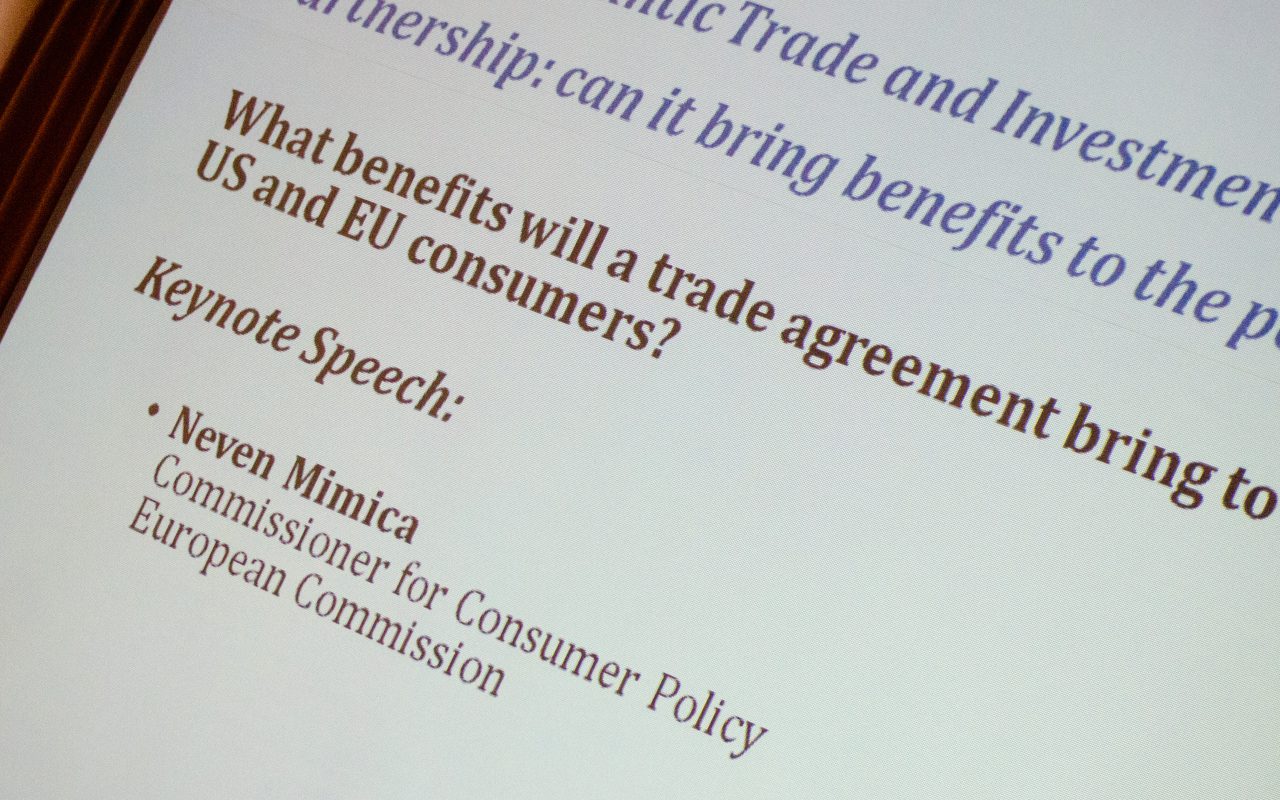On 29 October 2013, the Transatlantic Consumer Dialogue (TACD) hosted a public event that brought together a wide range of stakeholders to tackle these questions and many more. Over 200 representatives of consumer groups, other civil society organisations, industry, media and both the EU and US government took part in lively debate and exchange on what is really at stake for consumers. This report provides a recap of the key topics that were covered in a series of enlightening speeches and discussion panels, including food, data protection, financial regulation, intellectual property rights and transparency in the negotiating process.
Keynote address
TACD was grateful to Neven Mimica, the European Commissioner for Consumer Policy, as well as both the EU and US chief TTIP negotiators, for giving informative and substantive keynote speeches.
Commissioner Mimica highlighted the benefits which the TTIP would bring consumers, while underlining that these would not come at the expense of consumer safety or an erosion of standards.
In his speech, Dan Mullaney, Assistant US Trade Representative and chief TTIP negotiator for the US, said “the Transatlantic Trade and Investment Partnership – starting with the High Level Working Group – has been characterized by our desire for a broad range of input from our stakeholders, whose views on how we can improve this already very robust relationship are crucial to this process. As we move forward in these negotiations, we intend to continue this dialogue – and even deepen our exchange. We will achieve a stronger outcome if multiple perspectives and a balance of views continue to inform our negotiating positions.”
Ignacio Garcia-Bercero, the EU’s chief negotiator on behalf the European Commission’s Directorate General for Trade, underlined in his remarks the importance of strengthening cooperation between the EU and US when it comes to regulatory processes. He added that regulatory compatibility should be pursued in a way that does fully respect the right to regulate and does not undermine protection for consumers.
A key demand place on the EU and US is to step up efforts to make the negotiations more transparent. Consumer groups asked for full public access to the negotiation texts, as well as the possibility to provide meaningful input during the negotiations.
Rhoda Karpatkin, President Emeritus of Consumers Union in the US, highlighted that a trade agreement which touches upon all areas of interest for consumers – from the regulation of food to chemicals to financial services – cannot be negotiated behind closed doors by officials and then presented to legislators as “take it or leave it”. The recent failure of the ACTA agreement showed that the demands and expectations of civil society cannot be ignored.
It was apparent that the issue of food, including the key aspects of safety, choice and nutrition, could be a major stumbling block for the negotiations. Consumer representatives made it clear that they would oppose a trade agreement that weakens existing protections in both the EU and US.
Speaking on a discussion panel dedicated to this topic, Caroline Smith DeWaal from the Center for Science in the Public Interest in the US said that food standards should only be included in the agreement if the parties commit to protect the highest standards of consumer protection, including pathogen limits for E.coli and Listeria currently in place in the US. National governments should remain free to adopt more stringent levels of protection than agreed in the deal, including in the face of scientific uncertainty.
 The precautionary principle and respect of consumer choice were highlighted as guiding principles that must be preserved, especially in the areas of cloning, genetically modified organisms and chemical treatment of carcasses.
The precautionary principle and respect of consumer choice were highlighted as guiding principles that must be preserved, especially in the areas of cloning, genetically modified organisms and chemical treatment of carcasses.
Improvements in food traceability and rapid alert systems leading to better risk management and communication were mentioned as potentially positive outcomes of a trade agreement.
Data protection
TACD members repeated their demand to leave data flows out of the trade negotiations, pointing to the starkly different and unbalanced data protection regimes in the US and EU. Kostas Rossoglou, Senior Legal Officer at The European Consumer Organisation (BEUC), stated that including data protection in the TTIP could easily result in a significant weakening of privacy safeguards with little or no public input.
 Both the EU and US are in the process of formally reviewing their data privacy regimes. Plans to comprehensively update EU consumer data protection laws are currently being negotiated between the European Parliament and national governments. Only once data privacy laws are updated might there be a basis for discussions on data flows in a transatlantic context.
Both the EU and US are in the process of formally reviewing their data privacy regimes. Plans to comprehensively update EU consumer data protection laws are currently being negotiated between the European Parliament and national governments. Only once data privacy laws are updated might there be a basis for discussions on data flows in a transatlantic context.
‘Safe Harbor’, the framework which governs the exchange of data between the EU and US, is seriously flawed. EU and US consumer organisations were unanimous in their insistence that ‘Safe Harbor’ must be adequately harmonised with the provisions in the EU data protection legislation.
Intellectual Property Rights
In the context of Intellectual Property Rights (IPRs), the main area of concern is the risk that the access of US and EU citizens to knowledge and medicines could be unfairly limited.
In the area of health, consumer representatives reiterated that any measures that would hamper transparency in clinical trials must be prevented, as well as any obstructions to legitimate parallel trade of medical products.
Peter Bradwell of the Open Rights Group in the UK also highlighted that IPR enforcement measures should not mean the weakening of legal due process, privacy or any other fundamental right. More specifically, internet service providers should be protected from liability in relation to the transmission or storage of information. The principles of due process and the right to a presumption of innocence must be preserved, in order to avoid abusive measures being sanctioned, such as, for example, rights holders forcing internet providers to block their clients’ internet access.
Financial regulation
On the issue of financial services, the debate focussed on using the TTIP as an opportunity for the EU and US to exchange ideas about best practices in financial regulation. As a response to the recent devastating global financial collapse, regulators have finally recognised that this sector requires robust regulation to guarantee consumer protection, and in some cases have made progress in this regard – progress which must not be undone by a free trade deal.
Dominic Lindley , representing Which? in the UK said that a future trade agreement should set important minimum standards without limiting efforts to create stronger rules and regulations. Any moves by financial institutions in the EU and US that threaten vitally important protection regimes only recently set in place, such as the regulatory framework established under the Dodd-Frank Act in the US, will be fiercely resisted by consumer advocates.
Closing message from the Co-Chairs of TACD
In summing up the day’s events, Monique Goyens, Director General of BEUC and EU Chair of TACD, highlighted a hotly debated topic that formed a common thread across the various policy discussions, namely the proposed inclusion of Investor State Dispute Resolution provisions in the TTIP:
“A core concern we have with this trade deal is the suggestion of an investor/state dispute resolution system which would allow companies to sue governments for financial compensation. This brazen approach leaves open the possibility of private judgments being passed, outside of court, over governments’ future efforts to tighten up consumer protection. Such resolution schemes veer perilously close to what would essentially be corporate courts, preserving such interests over and above the public good.”
Ed Mierzwinski, Consumer Programme Director of the US Federation of Public Interest Research Groups (US PIRG) and US Chair of TACD, raised again the issue of transparency in his closing remarks:
“Trade negotiators need to understand that corporate special interests have a plan to hijack their treaty and use it to undercut hard-fought, democratically approved privacy, food safety and other consumer rights unless their negotiations are transparent and strongly consider the views and needs of consumers on both sides of the pond.”




